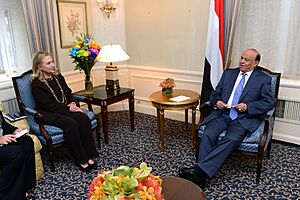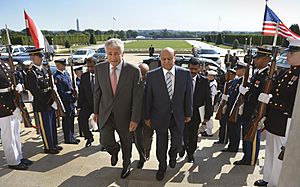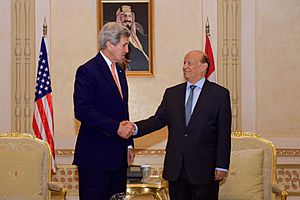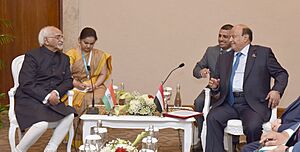Abdrabbuh Mansur Hadi facts for kids
Quick facts for kids
Abdrabbuh Mansur Hadi
|
|
|---|---|
| عبدربه منصور هادي | |
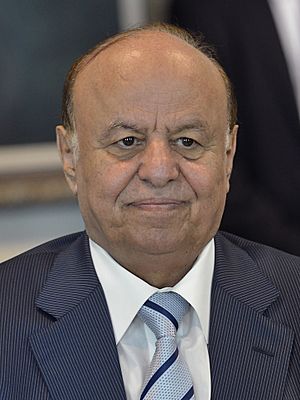
Hadi in 2013
|
|
| 2nd President of Yemen | |
| In office 27 February 2012 – 7 April 2022 Disputed from 22 January 2015 |
|
| Prime Minister |
|
| Vice President |
|
| Preceded by | Ali Abdullah Saleh |
| Succeeded by | Rashad al-Alimi (as Chairman of the Presidential Leadership Council) Abdul-Malik al-Houthi(De-Facto leader of Yemen) |
| Chairman of the General People's Congress | |
| In office 21 October 2015 – 7 April 2022 Disputed with Ahmed Saleh and Sadeq Amin Abu Rass |
|
| Preceded by | Ali Abdullah Saleh |
| Succeeded by | Vacant |
| Vice President of Yemen | |
| In office 3 October 1994 – 27 February 2012 |
|
| President | Ali Abdullah Saleh |
| Prime Minister |
|
| Preceded by | Ali Salem al Beidh |
| Succeeded by | Khaled Bahah |
| Defense Minister of Yemen | |
| In office 30 May 1994 – 3 October 1994 |
|
| President | Ali Abdullah Saleh |
| Prime Minister | Muhammad Said al-Attar |
| Preceded by | Haitham Qasem Taher |
| Succeeded by | Abdel Malik al-Sayani |
| Personal details | |
| Born | 1 September 1945 Thukain, Al Wade'a District, Abyan, Aden Protectorate |
| Nationality | Yemeni |
| Political party | General People's Congress |
| Military service | |
| Allegiance |
|
| Branch/service | |
| Years of service | 1964–2022 |
| Rank | Field marshal |
| Battles/wars |
|
Abdrabbuh Mansur Hadi (born 1 September 1945) is a Yemeni politician and military officer. He was the second President of Yemen from 2012 until 2022. Before that, he served as the second Vice President of Yemen from 1994 to 2012. He worked under President Ali Abdullah Saleh.
Hadi was also a Field marshal in the Yemeni Armed Forces. From June to September 2011, he was the Acting President. This happened while Ali Abdullah Saleh was getting medical care in Saudi Arabia. Saleh had been hurt in an attack during the 2011 Yemeni uprising. In November, Hadi became Acting President again. This was because Saleh stepped back from his role.
Mansour Hadi was chosen as president for a two-year period on 21 February 2012. He was the only candidate agreed upon by Yemen's political groups. However, some groups, like the Houthis, did not take part in the election. His time as president was extended for another year in January 2014.
On 22 January 2015, Hadi was forced to resign by the Houthis. This happened during protests against his decision to raise fuel prices. The Houthis and Saleh's supporters took over the presidential palace. They placed Hadi under house arrest. A month later, Hadi escaped to his hometown of Aden. He then said his resignation was not valid. He spoke out against the Houthi takeover. He went to Riyadh the next day. A group of countries led by Saudi Arabia then stepped in to support his government.
In 2022, Hadi stepped down from his role. He gave his power to a new group called the Presidential Leadership Council. This council is led by Rashad al-Alimi. This change happened during efforts to bring peace to Yemen's civil war.
Contents
Early Life and Military Career
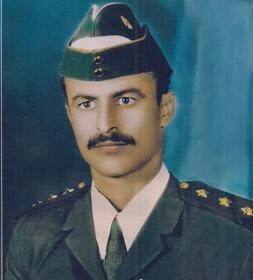
Abdrabbuh Mansur Hadi was born on 1 September 1945. He was born in Thukain, a village in southern Yemen. He finished military school in 1966. He was offered a scholarship to study in Britain. But he could not go because he did not speak English.
Hadi became a Major General in the military of South Yemen. In 1970, he studied tank warfare in Egypt. He then spent four years in the Soviet Union learning about military leadership. He held many military jobs in South Yemen. In 1986, he moved to North Yemen. This happened after a civil war in South Yemen.
During the 1994 civil war in Yemen, Hadi supported the government. He became the Minister of Defense. He led the military against the opposing forces. After the war, he was promoted to Vice-president on 3 October 1994.
President of Yemen
Becoming President
Hadi was the only person running in the presidential election. This election took place on 21 February 2012. Both the ruling party and the opposition supported him. The election commission said that 65 percent of voters participated. Hadi won with all the votes. He officially became President of Yemen on 27 February 2012. This was when Ali Abdullah Saleh formally left the presidency.
Political Changes
In March 2013, the National Dialogue Conference began. This meeting was important for Yemen's future. It brought together different groups to talk about key issues. In January 2014, Hadi pushed the groups to finish their discussions. They agreed that Yemen would become a federal government. This means power would be shared more locally.
Some people in Yemen did not like this idea. Especially those in the poorer, mountainous northwest. They worried they would get less money from the central government. They also feared losing access to the sea.
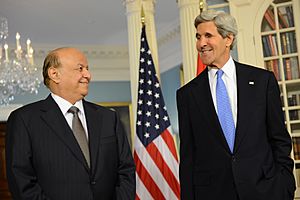
Military Reforms
Hadi worked to unite the Yemeni Armed Forces. The military had been divided since the Yemeni Revolution. In December 2012, he made a plan to reorganize the military. It was split into five main parts: Air Force, Army, Navy, Border Troops, and Strategic Reserve Forces. The Strategic Reserve Forces replaced the old Republican Guard.
Security Challenges
From the start, Hadi said fighting Al-Qaeda was a main goal. He told the British Foreign Secretary, "We will fight terrorism with full force." He said they would chase terrorists to their last hiding place.
In September 2012, Hadi warned about civil war. He said Yemen could become "worse than Afghanistan." This would happen if the national talks failed. He also said Yemen faced "three undeclared wars." These were from al Qaeda, pirates, and Houthi rebels.
Rebel Takeover and Civil War
In September 2014, the Houthis took over Sana'a. Hadi was forced to agree to a power-sharing deal. The Houthis refused to join the "unity government." But they kept control of key places in Sana'a. They also held land in northern Yemen.
Hadi resigned on 21 January 2015. Three days later, the Houthis took over the presidential palace. Hadi and his ministers were kept under house arrest.
After leaving Sana'a, Hadi went to his hometown of Aden. On 21 February, he said the Houthis' actions were against the law. On 26 March 2015, Hadi arrived in Riyadh. Saudi Arabia and its allies then launched airstrikes in Yemen. This was to support Hadi's government against the Houthis.
Resignation
On 7 April 2022, Hadi announced he was stepping down. He fired his Vice President, Ali Mohsen al-Ahmar. He gave his power to a new eight-member Presidential Leadership Council. This council is led by Rashad al-Alimi. Hadi said the council would talk with the Houthi rebels. Their goal was to agree on a lasting ceasefire. The new council leader had strong ties with Saudi Arabia.
Some officials from Saudi Arabia and Yemen said Hadi was pressured to give up power. They claimed he received a written order from Saudi Crown Prince Mohammed bin Salman. This order was to transfer his authority to the council.
See also
 In Spanish: Abd Rabbuh Mansur al-Hadi para niños
In Spanish: Abd Rabbuh Mansur al-Hadi para niños
 | Leon Lynch |
 | Milton P. Webster |
 | Ferdinand Smith |


